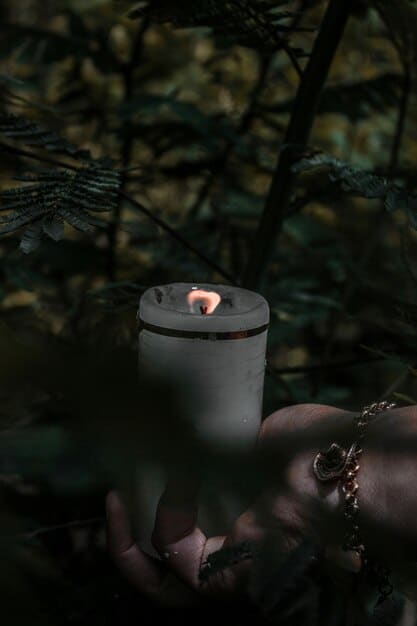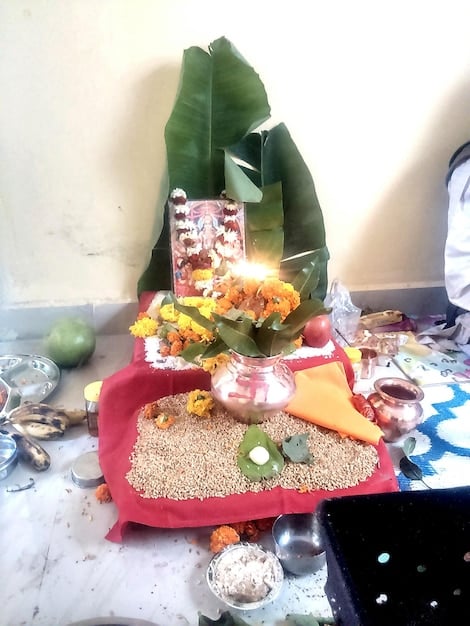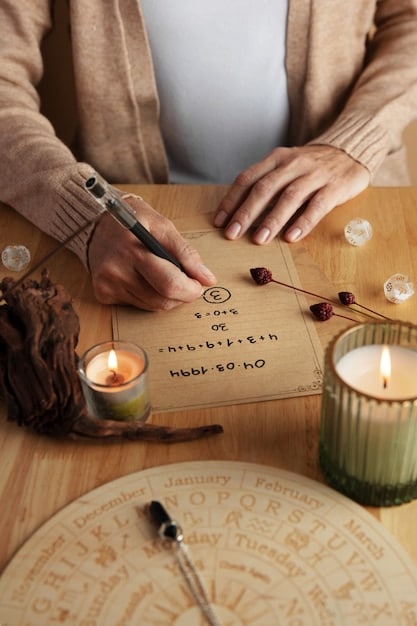Rituals for Spiritual Growth: Meaningful Practices for 2025

Rituals play a crucial role in spiritual development by providing structured practices that foster a deeper connection with oneself, the universe, and one’s beliefs, enabling individuals to cultivate meaning and purpose in the evolving landscape of 2025.
In the quest for inner peace and understanding, many seek solace and guidance through spirituality. As we approach 2025, the role of rituals in spiritual development becomes increasingly significant, offering a framework for creating meaningful practices that resonate with our evolving needs.
Understanding the Essence of Rituals
Rituals are more than just routines; they are deliberate actions infused with intention and symbolism. Understanding their essence is crucial for harnessing their power in spiritual development.
Defining Rituals: Beyond Habitual Actions
Rituals distinguish themselves from mere habits through their conscious creation and symbolic significance. Unlike habits, which are often performed unconsciously, rituals are intentionally designed to create a specific outcome or feeling.
The Psychological Impact Of Rituals
Psychologically, rituals provide a sense of control, reduce anxiety, and enhance focus. By engaging in predictable and meaningful behaviors, individuals experience a grounding effect that fosters mental clarity and emotional stability.
- Sense of control: Rituals offer a structured way to navigate uncertainty, giving individuals a sense of agency.
- Anxiety reduction: The predictability of rituals can be calming, helping to alleviate anxiety and stress.
- Enhanced focus: By directing attention to a specific task or intention, rituals improve concentration.
These psychological benefits underscore the importance of rituals as tools for managing the complexities of modern life and cultivating a balanced state of mind.
Historical and Cultural Significance of Rituals
Across cultures and throughout history, rituals have served as cornerstones of social cohesion, personal transformation, and spiritual expression. Exploring their historical and cultural significance provides valuable insights into their enduring power.
Rituals in Ancient Civilizations
Ancient civilizations, such as the Egyptians, Greeks, and Romans, heavily relied on rituals to honor their gods, mark important life events, and maintain social order. These rituals, often elaborate and communal, were central to their worldview and daily life.
Modern Interpretations and Adaptations
In contemporary society, rituals have evolved to meet the diverse needs and beliefs of individuals. While traditional religious rituals still hold significance for many, there is a growing trend toward secular and personalized rituals that reflect individual values and intentions.

- Personalized rituals: Tailored practices that align with individual values and intentions.
- Secular rituals: Non-religious practices that provide structure and meaning.
- Hybrid rituals: Blending traditional and modern elements for a unique spiritual experience.
This adaptability of rituals ensures their continued relevance in a rapidly changing world, allowing individuals to create meaningful connections with themselves and their communities.
Creating Personalized Spiritual Rituals for 2025
As we look toward 2025, the creation of personalized spiritual rituals becomes increasingly important. Tailoring rituals to individual needs and preferences can enhance their effectiveness and deepen their impact on spiritual development.
Identifying Your Intentions and Values
The first step in creating personalized rituals is to identify your core intentions and values. What do you hope to achieve through your spiritual practice? What principles guide your actions and decisions?.
Designing a Ritual that Resonates
Once you have a clear understanding of your intentions and values, you can begin designing a ritual that resonates with you on a personal level. Consider incorporating elements that hold special meaning or significance, such as music, art, or nature.

- Mindfulness meditation: Focus on the present moment to cultivate inner peace.
- Gratitude journaling: Reflect on the positive aspects of your life to foster appreciation.
- Nature walks: Connect with the natural world to promote a sense of interconnectedness.
By aligning your rituals with your individual needs and preferences, you can create a powerful tool for personal growth and spiritual development.
Integrating Rituals into Daily Life
Integrating rituals into daily life can transform ordinary moments into opportunities for spiritual connection and personal growth. Small, consistent practices can have a profound impact on overall well-being.
Morning Rituals for a Positive Start
Establishing a morning ritual can set a positive tone for the day, promoting focus, clarity, and intention. Consider incorporating activities such as meditation, yoga, or affirmations to cultivate a sense of calm and purpose.
Evening Rituals for Reflection and Gratitude
Evening rituals provide an opportunity to reflect on the events of the day, express gratitude, and prepare for restful sleep. Activities such as journaling, reading, or quiet contemplation can help to release tension and promote a sense of peace.
- Setting intentions: Start each day with a clear vision of what you want to achieve.
- Expressing gratitude: Acknowledge the positive aspects of your life to cultivate appreciation.
- Mindful transitions: Pause between activities to center yourself and maintain focus.
By weaving rituals into the fabric of daily life, you can create a consistent and sustainable path toward spiritual growth and personal fulfillment.
The Role of Community in Spiritual Rituals
While personal rituals offer profound individual benefits, the power of community in spiritual practices cannot be overstated. Shared rituals foster connection, support, and a sense of belonging.
Collective Rituals and Social Cohesion
Throughout history, collective rituals have played a vital role in promoting social cohesion and strengthening community bonds. Shared ceremonies, celebrations, and traditions provide a sense of unity and shared identity.
Finding or Creating a Spiritual Community
Whether through organized religious groups, secular communities, or informal gatherings, finding or creating a supportive spiritual community can enhance your personal practice. Sharing experiences, insights, and challenges with others can foster growth and resilience.
- Shared traditions: Participating in communal practices to strengthen bonds.
- Mutual support: Encouraging and uplifting one another on the spiritual journey.
- Collective growth: Learning and evolving together as a community.
By embracing the power of community, individuals can amplify the benefits of spiritual rituals and create a more meaningful and fulfilling life.
Overcoming Challenges in Maintaining Rituals
Maintaining consistent spiritual rituals can be challenging, especially in the face of busy schedules, distractions, and periods of doubt. Developing strategies to overcome these obstacles is crucial for long-term success.
Addressing Time Constraints and Distractions
One of the most common challenges in maintaining rituals is finding the time and space to dedicate to them. Prioritizing your spiritual practice, scheduling specific times for rituals, and minimizing distractions can help to overcome these obstacles.
Embracing Flexibility and Adaptability
It is important to recognize that life circumstances can change, and rituals may need to be adapted to fit new realities. Embracing flexibility and adaptability can prevent feelings of frustration and ensure that your spiritual practice remains sustainable.
- Prioritize your practice: Make your spiritual rituals a non-negotiable part of your day.
- Seek accountability: Partner with a friend or mentor to stay on track.
- Celebrate progress: Acknowledge and reward yourself for maintaining consistency.
By anticipating and addressing potential challenges, individuals can cultivate resilience and maintain a consistent spiritual ritual practice over the long term.
| Key Aspect | Brief Description |
|---|---|
| 🧘 Mindfulness Practices | Focusing on the present moment through meditation or breathwork. |
| ✍️ Journaling | Reflecting daily experiences, gratitude, and personal aspirations. |
| 🌿 Nature Connection | Spending time outdoors, grounding oneself in nature’s rhythm. |
| 🤝 Community Engagement | Participating in group rituals and spiritual discussions. |
Frequently Asked Questions (FAQ)
▼
Rituals provide structure and meaning to spiritual practices, fostering a deeper connection with oneself and the universe. They help to focus intention, reduce stress, and cultivate a sense of purpose.
▼
Start by identifying your intentions and values, then design a ritual that resonates with you. Incorporate elements that hold special meaning, such as music, art, nature, or symbolic objects.
▼
Examples include mindfulness meditation, gratitude journaling, nature walks, affirmations, and mindful transitions between activities. Choose practices that align with your needs and preferences.
▼
Prioritize your practice, schedule specific times for rituals, minimize distractions, and seek accountability from a friend or mentor. Embrace flexibility and adapt your rituals as needed.
▼
Community rituals foster connection, support, and a sense of belonging. Sharing experiences with others can enhance your personal practice, providing encouragement and mutual growth on the spiritual journey.
Conclusion
As we navigate the complexities of the modern world, the **role of rituals in spiritual development** offers a pathway to deeper meaning, purpose, and connection. By understanding the essence of rituals, creating personalized practices, and integrating them into daily life, individuals can cultivate a richer and more fulfilling spiritual experience as we move towards 2025 and beyond.





